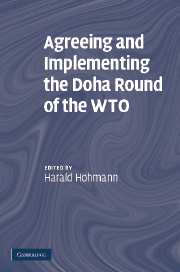Book contents
- Frontmatter
- Contents
- List of Contributors
- Foreword
- Introduction
- The future of the Doha Round
- PART ONE Development policy of the WTO
- PART TWO Trade policy (including competition) and trade facilitation
- PART THREE Reform of the dispute settlement system
- PART FOUR Social rights, health, and environment
- 15 Trade and human rights at work: Next round please …? Regulatory and cooperationist approaches in the context of the Doha Round
- 16 Food safety issues under WTO Agreements
- 17 Trade and the environment: With particular reference to climate change issues
- 18 Live with a quiet but uneasy status quo? An evolutionary role the appellate body can play in resolution of ‘trade and environment’ disputes
- 19 Health, environment and social standards in the Doha Round: Comparison of visions and reforms needed and the results achieved
- PART FIVE Conclusions
- Index
19 - Health, environment and social standards in the Doha Round: Comparison of visions and reforms needed and the results achieved
from PART FOUR - Social rights, health, and environment
Published online by Cambridge University Press: 23 February 2010
- Frontmatter
- Contents
- List of Contributors
- Foreword
- Introduction
- The future of the Doha Round
- PART ONE Development policy of the WTO
- PART TWO Trade policy (including competition) and trade facilitation
- PART THREE Reform of the dispute settlement system
- PART FOUR Social rights, health, and environment
- 15 Trade and human rights at work: Next round please …? Regulatory and cooperationist approaches in the context of the Doha Round
- 16 Food safety issues under WTO Agreements
- 17 Trade and the environment: With particular reference to climate change issues
- 18 Live with a quiet but uneasy status quo? An evolutionary role the appellate body can play in resolution of ‘trade and environment’ disputes
- 19 Health, environment and social standards in the Doha Round: Comparison of visions and reforms needed and the results achieved
- PART FIVE Conclusions
- Index
Summary
Introduction
With the successful conclusion of the Uruguay Round (1986–1994), and the subsequent creation of the World Trade Organization (WTO) on 1 January 1995, a new era in world trade began. The Uruguay Round has significantly increased the role given to the rule of law in the international trading system. The new WTO agreements and provisions are more precise and more detailed than the old General Agreement on Tariffs and Trade of 1947 (GATT 1947). The enlargement of trade areas covered by the WTO as opposed to the previous GATT 1947 reduces the scope remaining for unilateral action by individual states. The WTO plays an important role in ensuring that domestic regulations do not become de facto barriers to trade or hide protectionist policies.
At the same time, the interdependencies among countries in the world economy are becoming more intense, a phenomenon commonly labelled ‘globalisation’. Trade, investment, capital flows, technology and communication will continue to move us towards a more integrated, even borderless, world economy (‘global village’). Impediments to international exchange such as tariffs and political barriers lose importance, the economic distance shrinks, and a greater number of countries will participate in the world trading system. Globalisation of the world economy clearly presents national economic policy makers with enormous opportunities and challenges. For example, trade liberalisation during recent years has opened up new markets for many agricultural commodities and products. Some view globalisation as a process that is beneficial, a key to future world economic development, and also inevitable and irreversible.
- Type
- Chapter
- Information
- Agreeing and Implementing the Doha Round of the WTO , pp. 438 - 470Publisher: Cambridge University PressPrint publication year: 2008



